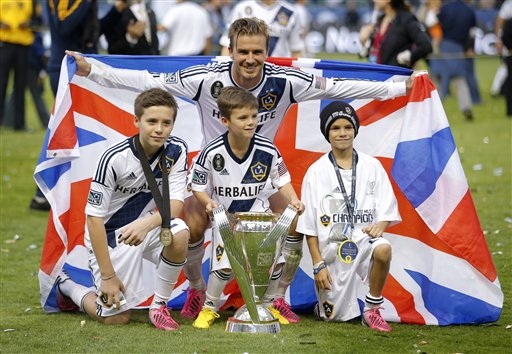
David Beckham came, he sold, he conquered.
For the first two years after he joined the Los Angeles Galaxy in 2007, he was more of a brand than a player, his impact at America's cash registers far greater than any transformation on the field.
By the time the 37-year-old English midfielder played his final game in Major League Soccer on Saturday, he had achieved his footballing and his financial goals, winning two more titles and expanding the U.S. audience for his sport. He gained attention for his ability, and not just for his ever-changing hairstyles, Spice Girl wife and celebrity friends.
"When I decided to come here, I think I raised a little bit of interest, and I hope that's what I've done," Beckham said. "If that's the single thing that I've done, then great. But I think the foundations are there now in this league. It's a 17-year-old league and the foundations are great. It will continue to grow."
The league expanded by about 50 percent, with new teams announced during the Beckham era that started play in San Jose (2008), Seattle (2009), Philadelphia (2010), Vancouver and Portland (2011), and Montreal (2012). That raised the total to 19.
Ground was broken for football-specific stadiums in Houston, Kansas City and Philadelphia, the long-delayed venue in New Jersey was completed, and extensive renovations took place in Montreal, Portland and Vancouver.
MLS' regular-season attendance averaged 15,504 in 2006, the last season before Beckham left Real Madrid to sign with the Galaxy. It was up to a record 18,807 this year, still well short of the record 44,293 set by the Bundesliga in 2011-12 and the 35,356 for England's Premier League.
Beckham said his goals were to win and increase awareness of the league both domestically and abroad.
"I don't think anybody would doubt that he has over-delivered on every one of those measures," MLS Commissioner Don Garber said. "There's arguably not a soccer fan on this planet that doesn't know the L.A. Galaxy and Major League Soccer, and David played a significant role in helping us make that happen. He was an unbelievable ambassador for the league, for the Galaxy."
Beckham made his debut for Manchester United's first team in 1992, the year when he turned 17 and played alongside Ryan Giggs and Gary Neville for the Red Devils' winning team in the FA Youth Cup. At 21, he made his debut for England.
He helped United win six Premier League titles, two FA Cups and the 1999 Champions League. Sold to Real for 35 million euros (then $41 million), he won Spain's La Liga in his fourth and final season.
By then, he had already announced he was moving to Los Angeles. While his handlers and the Galaxy hyped the deal as being worth "in excess $250 million," it turned out to be a $32.5 million, five-year contract. Still, he earned 50 times the league's average of $129,395 in 2008 and twice as much as any other player.
Following his first Galaxy appearance, in a friendly against Chelsea, he was given a welcoming party hosted by Tom Cruise and Katie Holmes at the Los Angeles Museum of Contemporary Art. A crowd of 46,686 showed up for his MLS debut on Aug. 9, 2007, at D.C. United.
While injuries limited his playing time, the five games he played averaged 37,659 fans — in a league where the overall average that year was 16,770. MLS jersey sales rose 780 percent.
"I don't think there's any doubt that David has increased the visibility of MLS and the sport more generally," U.S. Soccer Federation President Sunil Gulati said. "That very positive impact will be felt for many years."
When Beckham arrived, his mind seemed to be on England as much as it was on California. He commuted back to play for the national team, hoping to make its 2010 World Cup squad, and played on loan for AC Milan in early 2009 and 2010. While in Italy, he tore his left Achilles tendon, ending his England career after 17 goals and 115 appearances — second only to goalkeeper Peter Shilton's 125.
Only after the injury did he seem to focus on MLS. His relationship with Galaxy co-star Landon Donovan improved — Donovan took back the captain's armband — and Beckham helped Los Angeles to three straight league finals — beating Houston in the title game in 2011 and this year. He scored 20 goals in 116 competitive appearances over 6 1/2 years.
Only in television ratings did MLS fail to achieve a long-term boost. The league's regular-season telecasts on ESPN and ESPN2 averaged 311,000 viewers this year, up less than 5 percent over 2007.
Rafa Marquez, Thierry Henry and Robbie Keane followed him to MLS. Frank Lampard and Kaka may become the next big stars to join the league.
The very best players, Barcelona's Lionel Messi and Real's Cristiano Ronaldo, are far too good and far too expensive to leave Europe for MLS right now, a league still in its developmental stage.
Beckham, though, made it acceptable for stars just past their primes to trek across the Atlantic as salesmen and scorers. After the next stop in his playing career — likely the last — Beckham intends to return to MLS as an owner.
"I know it's the No. 1 sport in the world. There's other great sports here, of course, I believe it can compete with the basketball. I believe it can compete with American football and baseball," Beckham said. "That's why I'm totally committed to that."